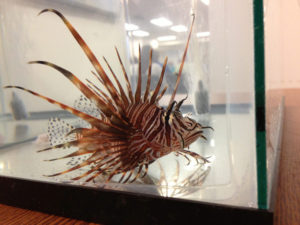Lionfish are as dangerous as they are beautiful. The invasive species — filling local waters at an alarming rate in recent years— threatens to take a serious bite out of the native environment.
“These lionfish are not only established, they are thriving and they are taking over our native ecosystem,†Elizabeth Underwood, lionfish program coordinator for the Reef Environmental Education Foundation, said in a presentation Monday before the Escambia County Marine Resources Advisory Committee.
Lionfish are native to the Indo-Pacific region. They were first spotted in U.S. waters in the mid-1980s. The fish are now established throughout the western Atlantic, Caribbean and Gulf of Mexico.
Out of their native habitat, Lionfish have no natural predators. And they eat pretty much everything, including a lot of juvenile game fish that are so precious to the local fisheries.
“Lionfish are gluttonous predators and they will eat and eat and eat,†explained Underwood.
Because lionfish pose such a dramatic threat on the natural ecosystem, with their unending appetites and rapid reproduction rates, efforts have mounted to combat the invasion. Divers now hold derbies aimed at slaying the fish en masse, as chefs and entrepreneurs attempt to energize the potential commercial market connected to the apparently tasty fish.
This weekend, the inaugural Lionfish Removal and Awareness Day is being held at Plaza de Luna in downtown Pensacola. The festival and tournament is being put on by Florida Fish and Wildlife Commission and is meant to make a dent in local lionfish populations, as well as educate the public and get more people involved in efforts to reduce the population. The event, May 16 -17, will feature live music, cook-offs, tastings and raffles.
“If lionfish have no natural predator, then we have to be the predator,†said Underwood.
For more information about the Lionfish Removal and Awareness Day, visit ReefRanger.com.




